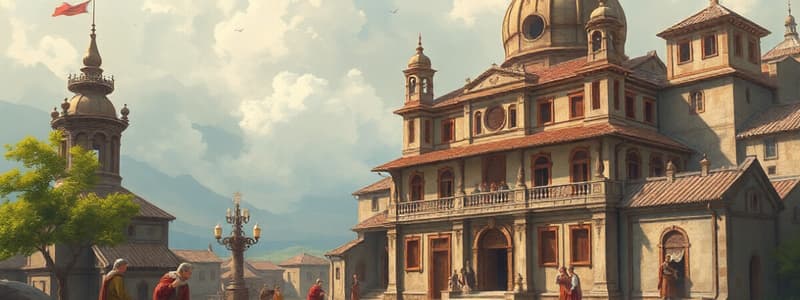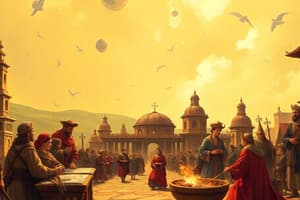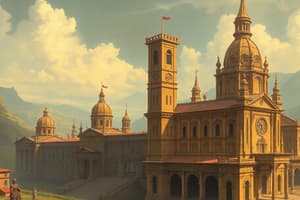Podcast
Questions and Answers
How did geographical explorations during the Renaissance impact Europe?
How did geographical explorations during the Renaissance impact Europe?
Geographical explorations led to the establishment of trade between Europe and the East, bringing prosperity and initiating colonization processes in Asia and Africa.
What role did the Renaissance play in the rise of nation states?
What role did the Renaissance play in the rise of nation states?
The Renaissance fostered feelings of nationality and progress in national literature, leading to the rise and growth of nation states.
How did the scientific outlook developed during the Renaissance affect social beliefs?
How did the scientific outlook developed during the Renaissance affect social beliefs?
The scientific outlook encouraged acceptance of ideas based on reason, challenging blind faith and fostering new discoveries.
What were the implications of the Renaissance for monarchical governments in Europe?
What were the implications of the Renaissance for monarchical governments in Europe?
In what ways did the Renaissance contribute to the development of the arts?
In what ways did the Renaissance contribute to the development of the arts?
What was the significance of the rise of the middle class during the Renaissance?
What was the significance of the rise of the middle class during the Renaissance?
How did the Renaissance lead to the Reformation Movement in Europe?
How did the Renaissance lead to the Reformation Movement in Europe?
What shift occurred in humanism during the Renaissance compared to the Middle Ages?
What shift occurred in humanism during the Renaissance compared to the Middle Ages?
How did the Renaissance influence the approach to scientific inquiry?
How did the Renaissance influence the approach to scientific inquiry?
Who is regarded as the 'Father of Humanism' and what contributions did he make?
Who is regarded as the 'Father of Humanism' and what contributions did he make?
What is the significance of Machiavelli's 'The Prince' in political literature?
What is the significance of Machiavelli's 'The Prince' in political literature?
Describe the impact of classical antiquity on Renaissance sculpture.
Describe the impact of classical antiquity on Renaissance sculpture.
Identify two important works by Michelangelo and their themes.
Identify two important works by Michelangelo and their themes.
What themes are present in Dante's 'Divine Comedy'?
What themes are present in Dante's 'Divine Comedy'?
How did Thomas More’s 'Utopia' characterize its society?
How did Thomas More’s 'Utopia' characterize its society?
What role did Geoffrey Chaucer play in Renaissance literature in England?
What role did Geoffrey Chaucer play in Renaissance literature in England?
What roles did many sculptors take on during the Renaissance in Italy?
What roles did many sculptors take on during the Renaissance in Italy?
What significant contributions did Michelangelo make while in Rome?
What significant contributions did Michelangelo make while in Rome?
How did the Renaissance artists express their glorification of the human form?
How did the Renaissance artists express their glorification of the human form?
What change in mindset marked the Renaissance's departure from the Medieval Age?
What change in mindset marked the Renaissance's departure from the Medieval Age?
What role did Italy's trade wealth play in the Renaissance?
What role did Italy's trade wealth play in the Renaissance?
Identify a famous painting by Raphael and discuss its significance.
Identify a famous painting by Raphael and discuss its significance.
What was the impact of the spirit of enquiry on society during the Renaissance?
What was the impact of the spirit of enquiry on society during the Renaissance?
Discuss how Michelangelo’s work in the Sistine Chapel reflects Renaissance themes.
Discuss how Michelangelo’s work in the Sistine Chapel reflects Renaissance themes.
Flashcards
Renaissance's Impact on Exploration
Renaissance's Impact on Exploration
Inventions spurred exploration, leading to trade with the East and the start of colonization.
Rise of Nation-States
Rise of Nation-States
The Renaissance fostered national identity and literature, leading to stronger countries.
Scientific Outlook
Scientific Outlook
The Renaissance promoted reason and observation over blind faith, encouraging new ideas.
Monarchies and Renaissance
Monarchies and Renaissance
Signup and view all the flashcards
Renaissance Art
Renaissance Art
Signup and view all the flashcards
Rise of the Middle Class
Rise of the Middle Class
Signup and view all the flashcards
Reformation from Renaissance
Reformation from Renaissance
Signup and view all the flashcards
Humanism's Emergence
Humanism's Emergence
Signup and view all the flashcards
Renaissance Science
Renaissance Science
Signup and view all the flashcards
Machiavelli's 'The Prince'
Machiavelli's 'The Prince'
Signup and view all the flashcards
Dante's 'Divine Comedy'
Dante's 'Divine Comedy'
Signup and view all the flashcards
Petrarch: Father of Humanism
Petrarch: Father of Humanism
Signup and view all the flashcards
Boccaccio's 'Decameron'
Boccaccio's 'Decameron'
Signup and view all the flashcards
Chaucer's 'Canterbury Tales'
Chaucer's 'Canterbury Tales'
Signup and view all the flashcards
Thomas More's 'Utopia'
Thomas More's 'Utopia'
Signup and view all the flashcards
Renaissance Sculpture
Renaissance Sculpture
Signup and view all the flashcards
Michelangelo's Legacy
Michelangelo's Legacy
Signup and view all the flashcards
Raphael of the Florentine School
Raphael of the Florentine School
Signup and view all the flashcards
Humanism's Ideal
Humanism's Ideal
Signup and view all the flashcards
Renaissance Art's Influence on the Human Form
Renaissance Art's Influence on the Human Form
Signup and view all the flashcards
Medieval vs. Renaissance Thinking
Medieval vs. Renaissance Thinking
Signup and view all the flashcards
Wealth's Role in Renaissance
Wealth's Role in Renaissance
Signup and view all the flashcards
Transition from Faith to Reason
Transition from Faith to Reason
Signup and view all the flashcards
Study Notes
Renaissance Summary
- Rise and Growth of Nation States:
- The Renaissance fostered national identity and literary progress.
- These factors led to the growth of nation states.
- Consequences of Geographical Explorations:
- Scientific advancements allowed for new trade routes and exploration.
- This led to new trade routes and exploration.
- Trade between Europe and the East grew, increasing prosperity.
- Expansion and colonization of Asia and Africa followed.
- Development of Scientific Outlook:
- People began to prioritize reason and logic.
- Scientific discoveries and inventions increased.
- This reduced blind faith and increased the progress of knowledge.
- Rise of Monarchical Form of Government:
- Strong monarchical systems emerged in Europe.
- This was caused by the decline in Church authority and desire for political stability.
- Development of the Arts:
- Art forms such as painting, sculpture, and architecture flourished.
- These developments contributed to artistic growth.
- Rise of the Middle Class:
- Feudal lords lost control as the middle class gained influence.
- Consequences of the Renaissance Movement:
- Reformation influenced England and Europe.
- Questioning, observation, and experimentation became important.
- This led to divisions within the Church, dividing the Catholics and Protestants.
- Humanism, a focus on man's life on Earth, developed.
- Science:
- Renaissance marked the beginning of modern science.
- Science and all discoveries were based on observation and experimentation.
- Modern scientific methods, including questioning and observation, emerged.
- Literature in Italy:
- Machiavelli, a significant political writer, emerged from Italy.
- Writers like Dante and Petrarch explored themes of soul, religion and daily life.
- Literature in England:
- Important writers like Geoffrey Chaucer and Thomas More emerged..
- England produced notable writers, poets, and dramatists.
- Renaissance English literature was prominent across Europe.
Renaissance Figures and Discoveries
- Michelangelo:
- A renowned sculptor, painter, architect, and poet.
- Created famous sculptures and paintings.
- Raphael:
- A prominent artist in the Florentine school.
- Known for his celebrated paintings.
- Donatello:
- An important sculptor who created a statue of David.
- John Kepler:
- A German scientist who proved planets revolve in ellipses.
- Galileo:
- Invented the telescope.
- Isaac Newton:
- Developed the Law of Gravitation.
- Vesalius:
- Wrote a treatise on anatomy.
- William Harvey:
- Discovered blood circulation.
- Paracelsus:
- Connected medicine and chemistry.
- Cordus:
- Prepared ether.
- Helmont:
- Discovered carbon dioxide.
- Francis Bacon:
- A famous essayist.
- William Shakespeare:
- A famous dramatist.
- Ben Jonson:
- A notable dramatist.
- Christopher Marlowe:
- A well known dramatist.
- John Milton:
- Author of Paradise Lost.
- Edmund Spenser:
- Wrote 'Faerie Queene.'
Key Themes
- Glorification of Human Form:
- Renaissance artists and scholars emphasized human physical achievements.
- Spirit of Enquiry:
- A willingness to question and explore expanded knowledge and understanding.
- Wealth from Trade:
- Italy's wealth from trade, and the Crusades helped spur the Renaissance.
Studying That Suits You
Use AI to generate personalized quizzes and flashcards to suit your learning preferences.





